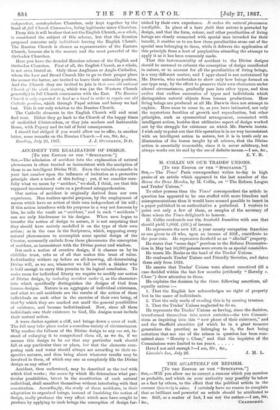M. COLLIN ON OUR TRADES' UNIONS.
[To THE EDITOR OF THE SPECTATOR."] SIR,— The Times' Paris correspondent writes to-day in high praise of an article which appeared in the last number of the Revue des Deux Mondes, by M. Collin, on " The Reform League and Trades' Unions."
To other persons than the Times' correspondent the article in question has appeared to be one stuffed with more blunders and misrepresentations than it would have seemed possible to insert in a paper published in SQ authoritative a periodical. I venture to point out only a few of them, as samples of the accuracy of those whom the Times delighteth to honour. M. Collin confounds our 40s. freehold franchise with one that should yield 1,000f. (401.) of income.
He represents the new 12i. a year county occupation franchise as one given to all who, upon an income of 300f., contribute to the poor-rate. He represents freehold as an " allodial" property.
He states that "some days" previous to the Reform Demonstra- tion in May last 50,000 persons were sworn in as special constables.
He treats Mr. Beales as the head of the Trades' Unions.
He confounds Trades' Unions and Friendly Societies, and dates them only from 1824.
He asserts that Trades' Unions were almost unnoticed till a case decided within the last few months (evidently " Hornhy v. Close ") drew attention to them.
He explains the decision by the three following assertions, all equally untrue :- 1. That the English law acknowledges no right of property but in the name of individuals.
2. That the only mode of evading this is by naming trustees.
3. That the Trades' Unions neglected to do so.
He represents the Trades' Unions as having, since the decision, transformed themselves into secret societies—the two Commis- sions as inquiring into this " new phase of their existence," and and the Sheffield atrocities (of which he in a great measure generalizes the practice) as belonging to it, the fact being notorious that not one of the crimes in question has been com- mitted since " Hornby v. Close," and that the inquiries of the Commissions were limited to ten years Have I not said enough ?—I am, Sir, &c.,






























 Previous page
Previous page